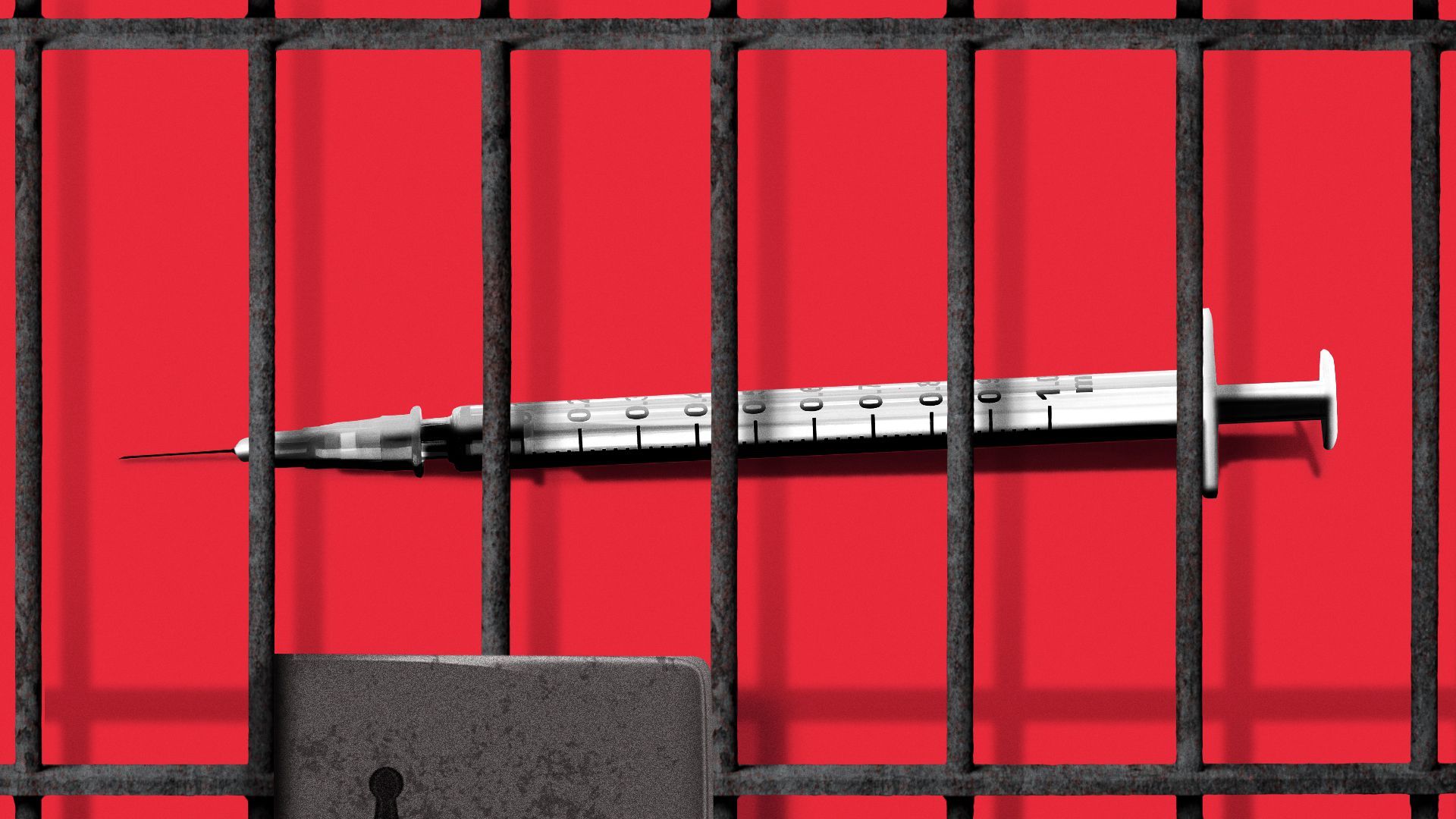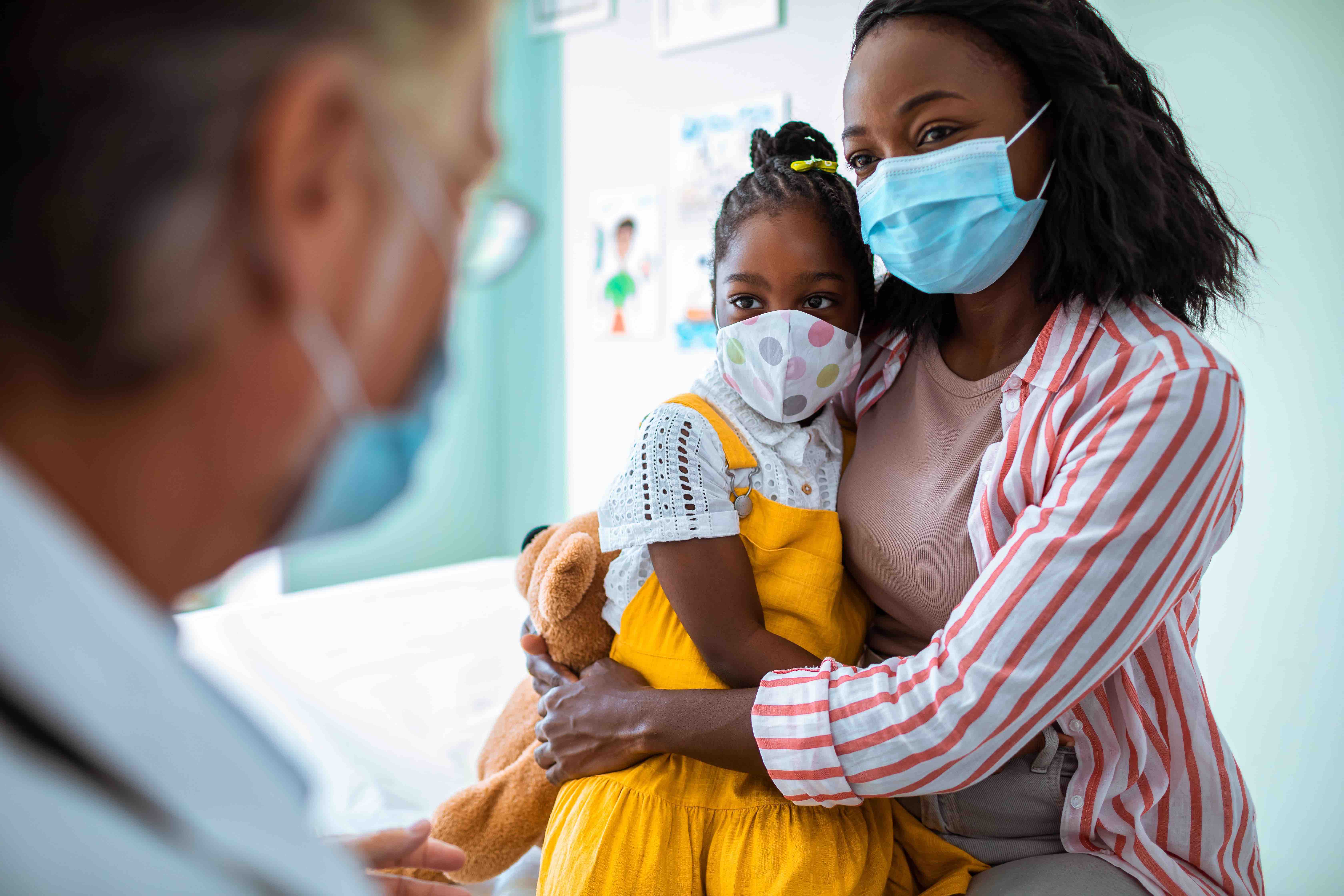| | | | | | | Presented By PhRMA | | | | Vitals | | By Caitlin Owens ·Mar 01, 2021 | | Good morning. Today's word count is 1,027, or a 4-minute read. | | | | | | 1 big thing: Most states aren't prioritizing prisons for vaccines |  | | | Illustration: Eniola Odetunde/Axios | | | | Most states have not made much of their incarcerated populations eligible for the COVID-19 vaccine, Axios' Marisa Fernandez reports. The big picture: Jails and prisons have seen big outbreaks and a higher death rate than the general public, but with supplies still limited, most governors aren't putting prisoners at the top of the list for vaccines. Where it stands: 15 states are currently rolling out vaccine to inmates, according to February data from the Kaiser Family Foundation. - Another 15 states are allowing vaccination of staff, but not inmates.
By the numbers: Over the course of the pandemic, prisons have seen roughly 380,000 cases and 2,500 deaths, according to The Marshall Project. Cases and deaths among staff likely are severely undercounted. - Around 28% of people incarcerated in state and federal prisons have tested positive for the virus, compared to about 9% of the total U.S. population, per KFF.
- In most states, the death rate among prisoners is higher than the overall COVID death rate.
The state of play: California, which has had the highest cases and deaths from this population next to federal prisons, has vaccinated the most people than any state within its correctional system — nearly 40%. Virginia and Massachusetts follow. - Governors in several states have opened vaccinations to prisoners who are over 70 or who have underlying health conditions — the same criteria they've used outside of prisons.
The other side: In Colorado, Gov. Jared Polis reversed the health department's plan to put incarcerated people ahead of elderly and those with chronic conditions, saying at a press conference that the vaccine won't "go to prisoners before it goes to people who haven't committed any crime." Yes, but: In Oregon, a federal judge ruled that putting inmates further down the state's vaccination list violated their constitutional rights, saying "the state must fulfill its duty of protecting those in its custody," and they are now ahead of seniors, CNN reports. |     | | | | | | 2. Vaccine hesitancy is shrinking |  Reproduced from KFF COVID-19 Vaccine Monitor; Chart: Axios Visuals The share of Americans who say they won't get vaccinated is already small enough that the U.S. should be able to reach herd immunity even if the most reluctant people don't change their minds, KFF's Drew Altman writes in today's column. By the numbers: According to the KFF Vaccine Monitor, 57% of adults either have already received at least one dose of a vaccine or plan to get vaccinated as soon as they can. - Another 22% are in a "wait and see" group, which has been shrinking.
Between the lines: Think of the "wait and see" group like persuadable swing voters. - Many are likely to get vaccinated as they see family members, friends and neighbors vaccinated without adverse effect.
- This group, which has also been shrinking, should be the focus of efforts to build confidence in the vaccines' safety and efficacy, especially in Black and Latino communities where both information and access are barriers to vaccination.
15% say they don't want to get vaccinated, and 7% say they'll only get vaccinated if they're required to at work. These numbers haven't really budged since December. - Even if the vaccine resisters don't switch, it's pretty easy to see how the country could vaccinate at least 70% of adults.
- Children are not yet eligible for the vaccine, but we can imagine them getting vaccinated at similar or greater rates than adults.
The bottom line: Many lower-income and working people do want to get vaccinated, but simply can't access vaccine sites or navigate the online appointment system. |     | | | | | | 3. A third COVID vaccine in the U.S. | | Almost 4 million doses of Johnson & Johnson's coronavirus vaccine were shipped last night, and will begin to be delivered to states starting on Tuesday, AP reports. Why it matters: The J&J vaccine adds to the total U.S. supply as we race to vaccinate as many people as we can, as quickly as possible. - J&J expects to deliver around 16 million more doses by the end of March, and 100 million total by the end of June, per AP.
Driving the news: The Food and Drug Administration on Saturday issued an emergency use authorization for the vaccine, the third to be authorized in the U.S., Axios' Shawna Chen writes. - Unlike the Pfizer and Moderna vaccines, J&J's is only one shot. It can also be stored at refrigerator temperatures for three months, making it easier to transport.
By the numbers: The vaccine was found to be 66.9% effective against moderate to severe/critical COVID-19 cases 14 days after vaccination, and 66.1% effective after 28 days. Against severe/critical cases, the vaccine was 76.6% effective after 14 days and 85.4% effective after 28 days. - A large clinical trial showed no COVID-19 hospitalizations or deaths 28 days after patients received the vaccine.
|     | | | | | | A message from PhRMA | | We are committed to being a part of the solution | | |  | | | | America's biopharmaceutical companies are committed to ending the pandemic by: - Continuing to develop treatments and vaccines to combat COVID-19,
- Working closely with governments, insurers and others to make sure vaccines and treatments are accessible and affordable.
| | | | | | 4. While we're at it, how about a malaria vaccine? | | The RNA technology that helped us get a COVID vaccine may be good for more than that. It might help us get a vaccine for malaria, too, Axios' David Nather writes. Driving the news: Scientists have applied for a patent for an RNA-based vaccine that might circumvent the problems that have made it difficult to come up with any kind of malaria vaccine, per the Academic Times. - It hasn't been tested on people yet, but one of the investors told the Times that it produced "probably the highest level of protection that has been seen in a mouse model."
- The only other vaccine we have right now for malaria — which killed 409,000 people throughout the world in 2019, mostly in Africa — is only about 30% effective.
What they're saying: "I'm as excited about the Covid vaccine as anyone, but THIS is huge news," health care economist Aaron Carroll tweeted. Yes, but: They should really test it on people. Until they do, the breakthrough isn't complete. - Still, if Aaron Carroll is excited about it, it's OK to get a little excited.
|     | | | | | | 5. Catch up quick |  | | | Illustration: Aïda Amer/Axios | | | | Just over 2.4 million coronavirus vaccinations were reported to the CDC on Sunday, matching Saturday's record-high for inoculations as seen in Bloomberg's vaccine tracker. Children under age 12 will "very likely" be able to get vaccinated for coronavirus at the "earliest the end of the year, and very likely the first quarter of 2022," NIAID director Anthony Fauci told "Meet the Press" Sunday. Wastewater is proving a valuable resource to genetically track the spread of the coronavirus — and the emergence of new variants, Axios' Bryan Walsh reports. Italy on Saturday announced it was tightening restrictions in five of the country's 20 regions in an effort curb the spread of the coronavirus. The Palestinian Authority on Saturday announced fresh coronavirus restrictions, including a partial lockdown, for the occupied West Bank as COVID-19 cases surge. The Brazilian capital of Brasilia will enter a 24-lockdown on Saturday as coronavirus cases and hospitalizations surge, Reuters reports. |     | | | | | | A message from PhRMA | | We are committed to being a part of the solution | | |  | | | | As we usher in a new Congress and new administration, we can all agree that people need quality, affordable health coverage that works when they need it. - We are focused on solutions that help patients better afford their medicines and protect access to innovation today and in the future.
| | | | | | Axios thanks our partners for supporting our newsletters.
Sponsorship has no influence on editorial content. Axios, 3100 Clarendon Blvd, Suite 1300, Arlington VA 22201 | | | You received this email because you signed up for newsletters from Axios.
Change your preferences or unsubscribe here. | | | Was this email forwarded to you?
Sign up now to get Axios in your inbox. | | | | Follow Axios on social media:    | | | | | |
Post a Comment
0Comments